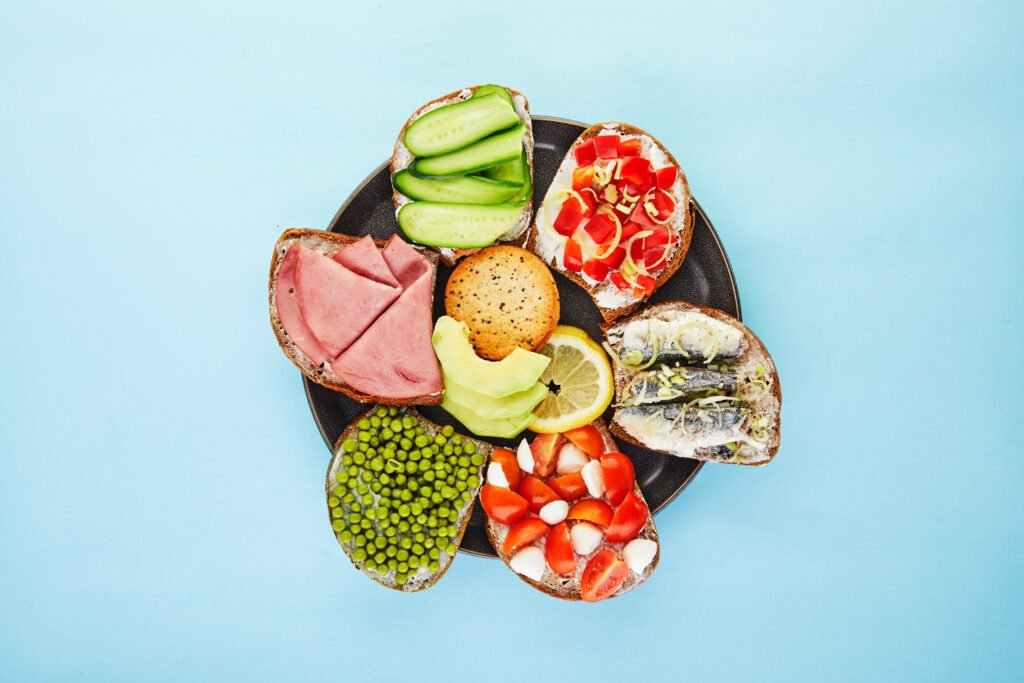Introduction
Following a balanced diet is essential for maintaining both physical and mental health. A balanced diet not only means maintaining weight, but also improving overall health and reducing the risk of chronic diseases. By choosing foods that provide the necessary nutrients in appropriate amounts, the body can function optimally. So, how can this balance be achieved? What are the essential steps to start following a balanced diet?
A variety of healthy foods that reflect the concept of a balanced diet.
Table of Contents:
- What is a balanced diet?
- Essential components of a balanced diet
- Proteins
- Carbohydrates
- Healthy fats
- Vitamins and minerals
- The importance of fiber in the diet
- How to distribute calories throughout the day
- Tips for following a balanced diet
- Common mistakes to avoid
- How to control portion sizes
- The importance of drinking water in a balanced diet
- How to stick to a diet without feeling deprived
- Conclusion: The path to a healthy and balanced life
- Frequently Asked Questions
1. What is a balanced diet?
A balanced diet is one that contains a variety of foods that provide all the essential nutrients needed by the body. This includes proteins, carbohydrates, healthy fats, vitamins, and minerals. In fact, consuming foods from different food groups helps meet daily body needs, leading to improved overall energy and health.
Although a balanced diet is not solely focused on weight loss, it is considered a holistic approach to living. First and foremost, it ensures adequate energy supply to the body throughout the day. Additionally, it contributes to boosting immune system functions and reducing the risk of chronic diseases such as heart disease and diabetes.

2. Essential components of a balanced diet
Proteins
Proteins are one of the most important components of a balanced diet, playing a vital role in building and repairing body cells. Furthermore, proteins help improve overall body functions, including muscles and the immune system. To obtain sufficient amounts of protein, you can consume a variety of sources such as white meats, fish, eggs, legumes, and nuts.
Similarly, protein enhances the feeling of fullness, making it important in weight management. Additionally, consuming protein helps improve metabolic processes, enhancing the body’s ability to burn fat.
Carbohydrates
Carbohydrates are considered the primary source of energy, making them an essential part of any balanced diet. In addition, consuming complex carbohydrates such as whole grains and vegetables ensures you have sustainable energy throughout the day, unlike simple carbohydrates that cause rapid spikes and drops in blood sugar levels.
However, one should be cautious of quick carbohydrates like added sugars and pastries, as they can lead to rapid weight gain. Thus, focusing on healthy and complex carbohydrates will have a positive impact on overall energy and health.
Healthy fats
Although fats may be associated with obesity, there are healthy fats that are essential for body health. Therefore, it is recommended to consume unsaturated fats found in fish, nuts, and avocados. For example, omega-3 fatty acids play a crucial role in improving cardiovascular health.
On the other hand, saturated and trans fats should be minimized, as they contribute to raising bad cholesterol levels. Thus, balancing fats in the diet contributes to better body functions.

Vitamins and minerals
Vitamins and minerals are considered micronutrients that the body needs in small quantities but are essential for health. For example, vitamin C boosts the immune system, while iron helps transport oxygen in the body. Moreover, consuming a variety of colorful fruits and vegetables ensures the body is supplied with these important elements.
Conversely, a deficiency in vitamins and minerals can lead to serious health issues such as anemia or a weakened immune system. Therefore, it is crucial for the diet to be rich in these elements through food diversity.

3. The importance of fiber in the diet
Dietary fiber is considered a key element for digestive health as it helps improve bowel movements and prevent constipation. Additionally, fiber plays a significant role in controlling blood sugar levels, making it particularly beneficial for individuals with diabetes.
Moreover, fiber contributes to prolonged feelings of fullness, aiding in effective weight management. It also helps reduce the risk of heart disease.
4. How to distribute calories throughout the day
While consuming calories in equal amounts may seem important, properly distributing calories plays a bigger role in enhancing daily performance. Therefore, it is preferable to eat small, multiple meals that contain all essential nutrients.
This way, you will have balanced energy throughout the day without experiencing extreme hunger or drops in blood sugar levels. Additionally, this method helps avoid overeating, reducing the chances of weight gain.
5. Tips for following a balanced diet
To achieve nutritional balance, you can follow these tips:
- First, identify your nutritional needs based on age, gender, and physical activity level.
- Second, choose fresh and unprocessed foods as much as possible.
- Third, maintain variety in your meals, focusing on consuming foods from different food groups.
- Fourth, avoid foods high in added sugars and saturated fats, as they can lead to weight gain and increase the risk of diseases.
Furthermore, it is important to monitor food quantities and avoid overeating. This way, you will better manage your weight and maintain cardiovascular health.
6. Common mistakes to avoid
On the other hand, there are some mistakes to avoid when following a balanced diet:
- Relying on a single type of food to achieve nutritional balance.
- Ignoring healthy foods due to poor taste.
- Skipping meals, as this can lead to decreased energy levels and overeating later.
- Additionally, avoid completely eliminating fats, as they are essential for the body and play an important role in maintaining heart health.
7. How to control portion sizes
Controlling portion sizes is one of the key principles for maintaining a healthy weight. Simply, you can reduce portion sizes by using smaller plates or measuring food quantities with a food scale. This way, you will be able to control calories without feeling deprived.
Additionally, eating slowly helps in feeling full faster, which reduces the risk of overeating.
8. The importance of drinking water in a balanced diet
Water is an essential part of any balanced diet. It aids digestion and detoxifies the body, in addition to improving skin health and maintaining energy levels. Moreover, drinking adequate amounts of water reduces feelings of hunger and contributes to enhancing the feeling of fullness.

9. How to stick to a diet without feeling deprived
To maintain adherence to a diet without feeling deprived, you can try some strategies such as:
- Snacking on healthy options like fruits and nuts.
- Additionally, trying new and innovative recipes makes eating an enjoyable experience.

10. Conclusion: The path to a healthy and balanced life
Following a balanced diet is not just a step to improve physical appearance, but it is a lifestyle approach that helps enhance overall health and improve quality of life. From this perspective, when you follow a balanced diet, you are providing your body with the necessary nutrients it needs to function efficiently. You also reduce the risk of many chronic diseases and maintain energy and vitality levels throughout the day.
Simply, by focusing on consuming a variety of fresh foods and moderating portion sizes, you can achieve the perfect balance that makes you feel energetic and satisfied. Furthermore, it is important to remember that nutritional balance is not a temporary goal, but a lifestyle that can last a lifetime.
11. Frequently Asked Questions
- What is the difference between a balanced diet and a weight loss diet? A balanced diet focuses on providing all the nutrients the body needs to function properly, regardless of weight loss. In contrast, a weight loss diet is often restricted in calories and primarily targets weight reduction, which may not provide all the necessary nutrients if not followed carefully.
- Can I follow a balanced diet if I am vegetarian? Yes, it is entirely possible to follow a balanced diet while being vegetarian. Just ensure to obtain protein from plant-based sources like legumes, nuts, and seeds. Additionally, it is important to diversify plant food sources to ensure adequate intake of all necessary vitamins and minerals.
- How often should I eat small meals throughout the day to maintain a nutritional balance? It is preferable to eat multiple small meals throughout the day, as this helps maintain a steady energy level and control appetite. Therefore, consuming 5-6 small meals daily can assist in achieving this nutritional balance, in addition to controlling calorie intake.
- Can I include fats in a balanced diet? Yes, healthy fats are an essential part of a balanced diet. However, focus on unsaturated fats such as those found in fish, avocados, and nuts, while avoiding saturated and trans fats that can lead to health issues.
- How can I consume carbohydrate-rich foods without gaining weight? Simply focus on complex carbohydrates such as whole grains, vegetables, and fruits. These types provide sustainable energy and help control weight. Additionally, consuming carbohydrates in appropriate amounts without overdoing it and monitoring portion sizes can prevent weight gain.
- Is taking vitamins and minerals from supplements a good substitute for natural foods? Supplements can be helpful if there is a specific deficiency in vitamins or minerals. However, it is always preferable to obtain these nutrients from natural foods, as food contains a variety of elements that work together to better support health.
- How can I maintain a balanced diet during busy days? Planning ahead is the best solution. For instance, you can prepare quick, healthy meals in advance and carry them with you throughout the day. Additionally, relying on healthy snacks such as fruits and nuts that can be easily consumed on the go can be beneficial.

By following these tips and guidelines, you can ensure that your diet is not only balanced but also sustainable and beneficial to your long-term health. Finally, continuing to consume a variety of foods and good meal planning will contribute to enhancing your lifestyle.

